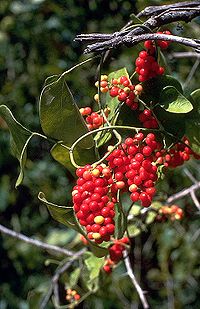- Cocculus carolinus
-
Cocculus carolinus 
Scientific classification Kingdom: Plantae Division: Magnoliophyta Class: Magnoliopsida Order: Ranunculales Family: Menispermaceae Genus: Cocculus Species: C. carolinus Binomial name Cocculus carolinus Cocculus carolinus, otherwise known as Carolina Coralbead, Redberry Moonseed or the Carolina snailseed, is a vine of the genus Cocculus. It is indigenous to several states in the United States along the south to midwest. It gets its name from the bright red color of the marble-like berry that protrudes from the leaves of the plant.
Contents
Description
The Carolina Coralbead is a deciduous, woody vine that can twine along the trunks of several tress or along the ground. It occurs in timberline areas, rocky woods, glades, fence rows and ponds. Carolina Coralbead can grow 10-12 ft (3-3.6 m) and usually spaced within 3-4 ft (90-120 cm) of one another. If ingested in large amounts, the berry on Cocculus carolinus can be poisonous, but the overall toxicity of its berries do not prove to be fatal. In areas in Little Rock, Arkansas, the Carolina Coralbead is referred to as an invasive weed system which seedlings have been spread by birds. Once a root system has been established, it is hard to remove the plant, so planting in new areas has been a point of concern for this species. The best ornamental features of the plant are its foliage and its attractive red berries in fall.
- Temperature: Can grow in temperatures ranging from -3.8 °C (25 °F) to -28.8 °C (-20 °F).
- Interesting Feature: easily recognizable due to its leaf which is shaped like an elephant's head.
- Leaves: covered in short hairs and should not be confused with the species Smilax bona-nox, which has tendrils and prickles.
Distribution
Carolina Coralbead has been reported in the states of Alabama, Arkansas, Kansas, Mississippi, North Carolina, Oklahoma, Tennessee and Texas. Common environments favoring this species are open woodlands and openings in forest canopies and exposed areas such as along streambanks and roads.
Cultivation
The flowers are small, and plentiful. At a young age, Carolina Coralbead appear greenish. The seed need cold stratification of 3 months. Seeds germinate in 21-30 days at 68° F. Bloom time for the plant is in late Spring and mature by late Summer. They grow in tight abundant amounts of bright red berries. By utilizing its scarlet fruits for aesthetic effects, landscapers allow it to be grown on trellises, fences or let naturally flourish through other weeds and shrubs. The berries should not be eaten by people but are eaten by a large number of birds. Each fruit has a single seed that resembles a small snail shell, protected by the hard endocarp or the inner section of the ovary wall.[2] [3]
Chemical components
Through photochemical analysis using spectral and mixed-melting comparison, it was discovered that the stems and leaves of Cocculus carolinus consisted of six compounds: two cyclitols, (+)quercitol and (−)viburnitol; a lactone, loliolide; and three alkaloids, sinoacutine, magnoflorine, and palmatine.
References
- ^ Garden, Dave's. "PlantFiles: Carolina Moonseed, Carolina Snailseed, Coralbead Cocculus carolinus". http://davesgarden.com/guides/pf/go/1574/. Retrieved 24 April 2011.
- ^ "Menispermaceae". Cocculus Carolinus. UTexas. http://www.sbs.utexas.edu/bio406d/images/pics/men/cocculus_carolinus.htm. Retrieved 24 April 2011.
- ^ Del C. Ortiz, Rosa; Elizabeth A. Kellogg, Henk van Der Werdd (August 2007). "Molecular phylogeny of the Moonseed family (Menispermaceea): Implications for Morphological Diversification". American Journal Of Botany. http://www.amjbot.org/cgi/content/full/94/8/1425?maxtoshow=&hits=10&RESULTFORMAT=&author1=Rosa+Del+C.+Ortiz&fulltext=menispermaceae&searchid=1&FIRSTINDEX=0&sortspec=relevance&resourcetype=HWCIT. Retrieved 24 April 2011.
Categories:- Menispermaceae
- Cocculus
Wikimedia Foundation. 2010.
